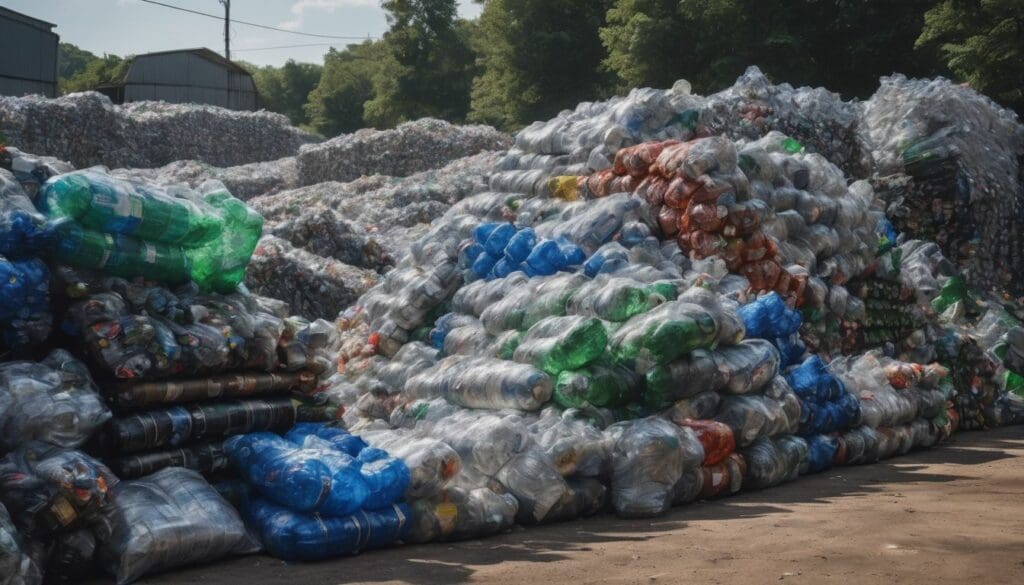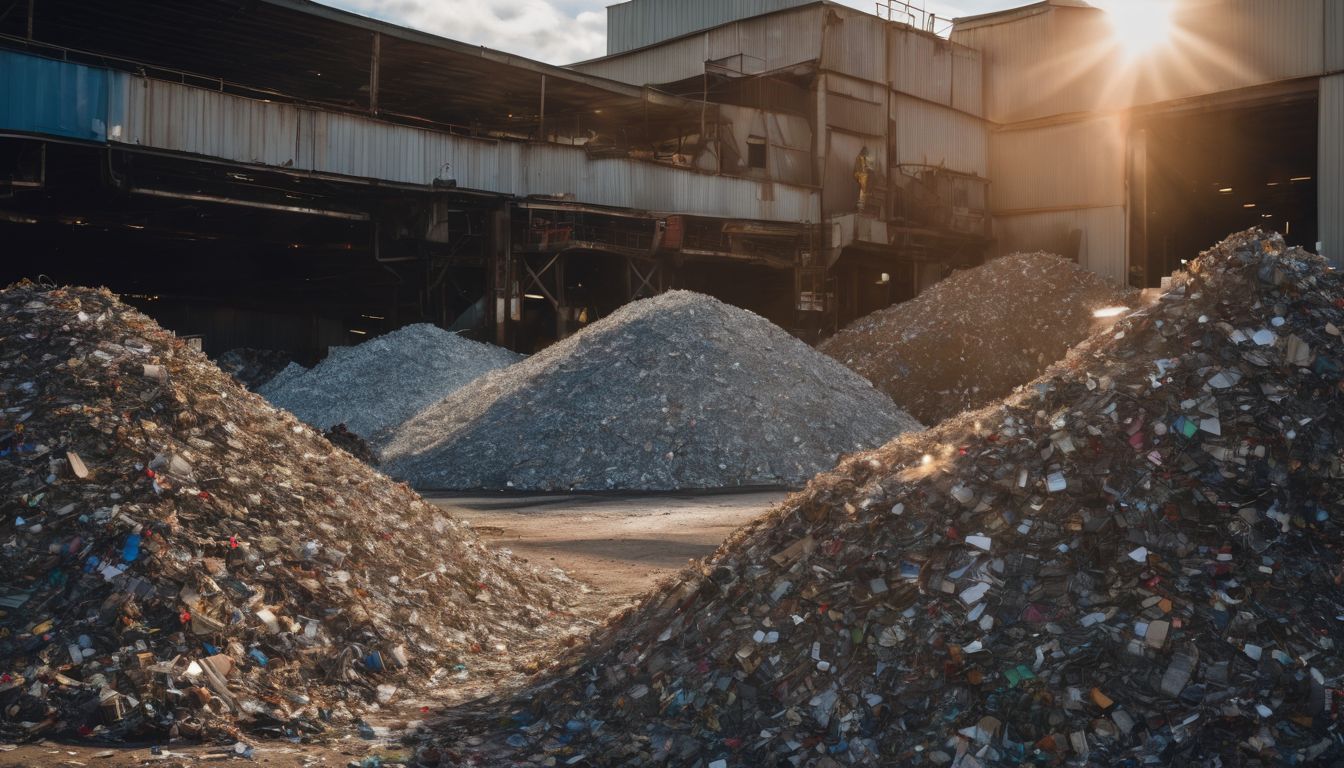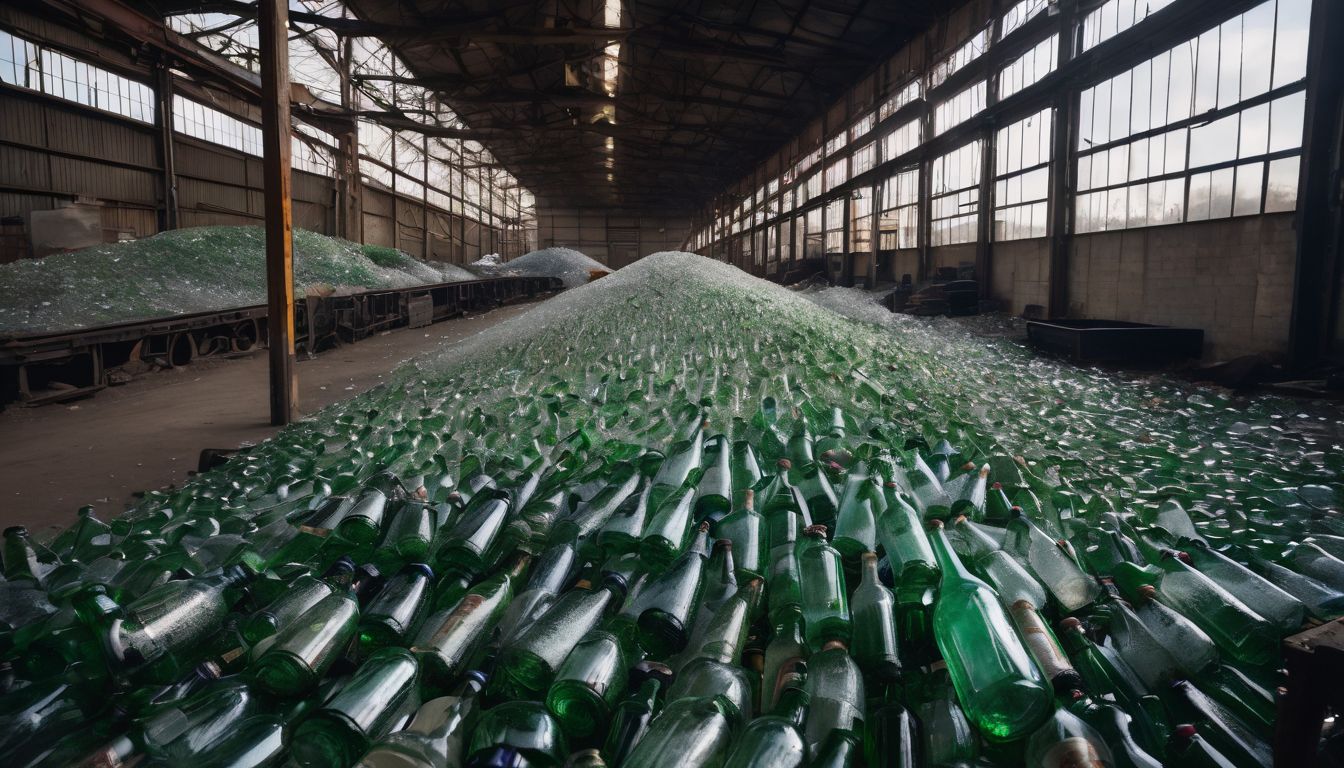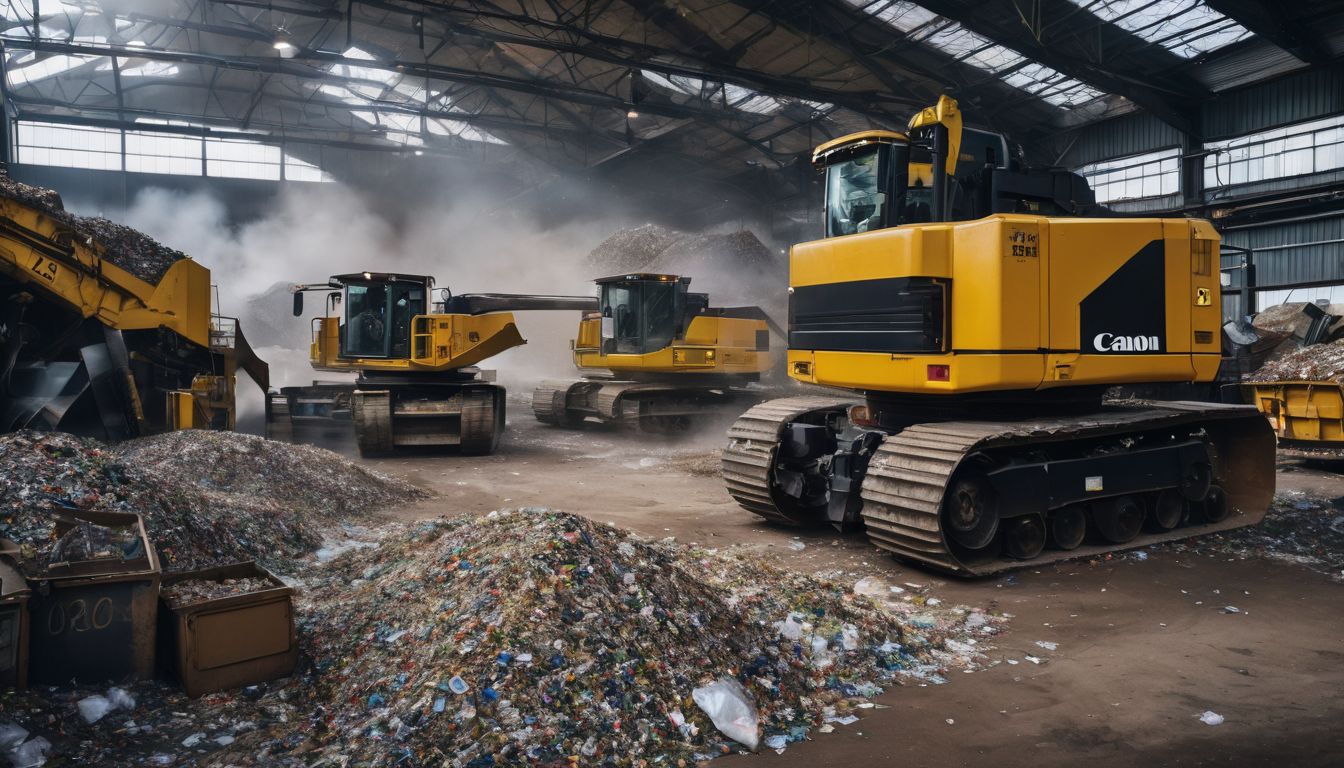As we look around, it’s clear our planet is facing a waste crisis. Every year, the UK alone produces over 200 million tonnes of waste, much with the potential to be recycled. This article will uncover how recycling can be a powerful weapon in the fight against climate change and what benefits it brings us all.
Keep reading – change is in your hands!
Key Takeaways
- Recycling reduces the need for raw material extraction, saving up to 95% of energy when using recycled aluminium compared to virgin materials.
- By lowering demand for new resources and reducing landfill waste, recycling significantly cuts down greenhouse gas emissions that contribute to climate change.
- Investment in recycling technology creates jobs and supports economic growth within local communities, bolstering a sustainable economy.
- Reusing materials like paper, plastic, glass, and metal helps preserve natural resources such as forests and fossil fuels while preventing pollution from mining and drilling activities.
- Choosing products made from recycled materials encourages domestic manufacturing processes that are less carbon-intensive than those using raw materials.
The Impact of Recycling on Climate Change
Recycling plays a crucial role in mitigating climate change by conserving energy, reducing greenhouse gases, preserving natural resources, and minimising waste and pollution. Its impact extends to both the environment and the economy.
Conserving energy
Saving energy is a vital outcome of recycling. When we recycle materials like paper, plastic, and metal, we use less fresh raw material from the Earth. This means less energy needed to extract and process these resources.
For instance, making products from recycled aluminium saves up to 95% of the energy required compared to using virgin materials.
Manufacturing with recycled materials often requires less power. Energy conservation reduces carbon dioxide emissions that contribute heavily to greenhouse gas levels in our atmosphere.
Simple actions such as separating recyclables can lead to significant energy savings across multiple industries, helping us move towards a more sustainable living model that benefits both the environment and future generations.
Reducing greenhouse gases
Conserving energy through recycling reduces the demand for new raw materials, limiting the need for energy-intensive extraction and processing. This minimises greenhouse gas emissions produced during the manufacturing of products from virgin materials.
By reusing and recycling materials, we can reduce our carbon footprint significantly. The act of recycling plastic, paper, glass, and metal leads to a decrease in emissions associated with extracting, transporting, and processing raw materials.
Preserving natural resources through increased recycling lessens the exploitation of fossil fuels for material extraction and production processes. As a result, this directly contributes to reducing greenhouse gas emissions that stem from these activities.
Preserving natural resources and landfill space
By recycling, we can decrease the amount of waste going into landfills and preserve natural resources. Recycling paper, glass, and metal reduces the need for raw material extraction.
This leads to less deforestation, mining, and drilling – all essential in preserving our planet’s finite resources.
Furthermore, recycling plays a crucial role in reducing pollution by preventing harmful chemicals from seeping into the soil at landfill sites. By diverting waste from landfills through recycling efforts, we can contribute towards creating a healthier environment for future generations while conserving precious natural resources.
Reducing waste and pollution
Recycling helps to reduce waste and pollution by diverting materials from landfills. Reusing and repurposing items prevents them from ending up in the environment, mitigating pollution that harms wildlife and ecosystems.
By choosing recycled products, individuals can lower their carbon footprint, supporting a more sustainable future for our planet.
Furthermore, recycling paper, plastic, glass and metal reduces the need for new raw materials which often require significant energy and resources to produce. This approach helps to lower pollution levels associated with resource extraction while also preserving natural resources for future generations.
Economic Benefits of Recycling
Recycling creates jobs, stimulates investment, and supports domestic manufacturing. Read on to discover how recycling can play a key role in combating climate change.
Creating jobs
Recycling creates job opportunities in various sectors such as collection, sorting, processing, and manufacturing. By supporting recycling efforts, individuals can contribute to the growth of a sustainable economy and the creation of employment opportunities in their communities.
Jobs are generated in recycling facilities for tasks such as sorting and processing recyclable materials, operating machinery, and managing waste streams. In addition, there are employment prospects in industries that utilise recycled materials to produce new products.
By participating in recycling initiatives and advocating for environmentally friendly practices, individuals can actively promote job creation within their local economies while contributing to global sustainability efforts.
The act of recycling directly supports the development of a circular economy by providing employment within the waste management industry. This enables an increase in economic activities related to resource conservation and environmental sustainability.
Stimulating investment
Recycling creates opportunities for stimulating investment in new technologies and infrastructure. The growing demand for recycled materials encourages businesses to invest in innovative recycling processes, machinery, and facilities.
New investments also drive research and development in eco-friendly practices, creating a ripple effect across various industries.
Investment in recycling contributes significantly to economic growth by fostering job creation and supporting domestic manufacturing. By encouraging the use of recycled materials, individuals can further stimulate investment in sustainable ventures while reducing their carbon footprint.
Supporting domestic manufacturing
Supporting domestic manufacturing through recycling plays a crucial role in reducing carbon emissions by minimising the need for raw material extraction and transportation. Recycling not only creates local job opportunities but also bolsters the economy and fosters sustainable production practices, contributing to environmental conservation and pollution reduction.
By incorporating recycled materials into manufacturing processes, businesses can embrace eco-friendly practices that align with renewable resource usage, thereby lessening their carbon footprint while supporting the growth of a greener economy.
Engaging in recycling initiatives enables communities to bolster domestic production, stimulate investment, and reduce reliance on non-renewable resources. This active involvement supports environmentally conscious individuals in advocating for sustainable solutions that address climate change mitigation through practical economic measures.
Environmental Benefits of Recycling
Recycling helps in saving energy and reducing greenhouse gas emissions. It also plays a crucial role in preserving natural resources for future generations.
Saving energy
Cutting down on the amount of energy we use is a critical part of combating climate change. When products are made from raw materials rather than recycled ones, more energy is consumed during the manufacturing process.
Recycling enables us to save energy by reducing the need for new production and enabling items to be made with fewer resources.
Recycling conserves energy by minimising the need for creating new products from scratch, which usually involves consuming significant amounts of power. By reusing materials like plastics and metal through recycling, less electricity is needed in manufacturing, contributing to a reduced carbon footprint and helping protect our planet’s finite resources.
Reducing greenhouse gas emissions
Recycling helps in reducing greenhouse gas emissions. When we recycle materials such as paper, glass, and metal, it cuts the need for producing new items from raw materials. This reduction in production lowers the energy required and decreases greenhouse gases emitted during manufacturing processes.
By recycling more, we can actively contribute to lowering carbon footprints and promoting eco-friendly practices. Embracing recycling as a habit is crucial in mitigating climate change.
When we prioritise recycling efforts, we directly impact our environment positively while also supporting conservation and environmental sustainability. The next step after understanding the impact of reducing greenhouse gas emissions is exploring how preserving natural resources plays a vital role in combating climate change.
Preserving natural resources
Preserving natural resources is crucial for sustaining the environment and combating climate change. By recycling materials like paper, plastic, and glass, we reduce the need to extract raw materials from the earth.
This helps to conserve forests, reduce mining activities, and protect habitats. Additionally, recycling aluminium and steel can save substantial amounts of energy that would otherwise be used in the manufacturing process.
Moreover, by reusing materials through recycling programs, we can decrease our reliance on non-renewable resources such as fossil fuels. This approach diminishes carbon emissions associated with extracting and processing virgin materials.
How Recycling Can Help Combat Climate Change
Recycling can help combat climate change by limiting the use of raw materials and reducing waste going into landfills. This in turn helps to reduce carbon emissions and decrease the overall environmental impact.
Limiting the use of raw materials
By recycling materials such as paper, plastic, glass, and metal, we can limit the need for raw materials extraction. This reduces the pressure on natural resources like forests and mines.
By reusing these materials, we also decrease the energy required to extract and process virgin resources.
Using recycled materials in manufacturing means less demand for new resources. This not only conserves non-renewable resources but also diminishes the associated carbon emissions from production processes.
Reducing waste going into landfills
Recycling helps to reduce the amount of waste sent to landfills. Instead of disposing of items that can be recycled, such as paper, plastics, and glass, recycling allows these materials to be reused.
By diverting materials from landfills, less space is taken up by waste, reducing the need for additional landfill sites and limiting pollution associated with landfill practices. Additionally, reducing waste going into landfills through recycling minimises methane emissions which contributes to a reduction in greenhouse gas emissions.
Furthermore, by preventing recyclable materials from being buried in landfills and decomposing over time, recycling aids in conserving natural resources and energy while mitigating environmental impacts linked to manufacturing new products from raw materials.
Conclusion
In conclusion, recycling plays a vital role in mitigating climate change by conserving energy and reducing greenhouse gas emissions. The economic benefits of recycling include creating jobs and supporting domestic manufacturing.
Additionally, recycling helps combat climate change by limiting the use of raw materials and reducing waste going into landfills. Overall, embracing eco-friendly practices such as recycling is essential for combating climate change and preserving our planet for future generations.
FAQs
1. Why is recycling important for climate change?
Recycling helps in pollution prevention and reduces our carbon footprint by saving renewable resources and cutting down on the need to extract and process raw materials.
2. Can recycling actually help slow down climate change?
Absolutely, through ecofriendly practices like recycling, we can decrease greenhouse gas emissions that contribute to global warming, thereby aiding in climate change mitigation.
3. What types of materials should I focus on recycling?
Focus on materials such as paper, plastics, glass, metals, and electronics because they have significant potential for pollution prevention if recycled properly.
4. How does reducing waste through recycling benefit the environment?
When you recycle more, we send less trash to landfills; this leads to a reduction in harmful methane emissions from waste decomposition and conserves energy used in new product manufacturing.





